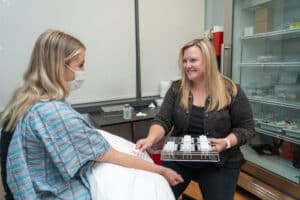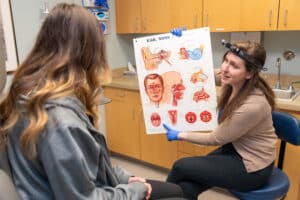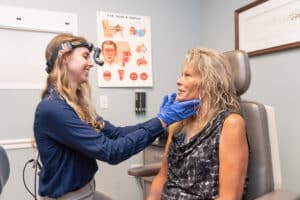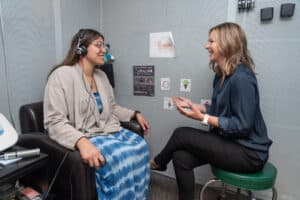Allergy Center
Welcome!
We are a customer service driven medical based allergy clinic specializing in testing and treatment for upper respiratory allergies. Our team of doctors and technicians provides accurate skin testing, in-depth counseling, and targeted treatments utilizing sublingual immunotherapy (SLIT)-allergy drops. As a courtesy, allergy drops can be conveniently shipped to our patients (shipping costs may apply).
What are Allergies?
Allergies develop when our bodies overreact to certain substances that they come in contact with. These substances can be inhaled, ingested or touched. These substances, called allergens, are seen as harmful by the body even if they truly are not. When contact is made, the body’s immune system goes into attack mode and mounts up a defense to try to eliminate the allergen. Allergic responses can vary from a mild, annoying runny nose to severe, life threatening reactions that interfere with breathing.
When people first experience an allergic reaction, they don’t often know what caused it. It may take a few times before the cause becomes clear but sometimes allergy testing is the only way to know for sure what is causing the allergic reactions. A thorough history and exam by a medical professional will also shed light on possible causes.
Common Allergies We Treat
Our team specializes in testing and treatment for upper respiratory allergies. These are some of the most common allergies we treat.
Pets
Pets are a common source of allergies. Allergies to cats and dogs are very common and cause symptoms in approximately 10%-20% worldwide. In the U.S. 7 out of 10 households have a pet of some sort and really any pet that has fur or feathers can cause an allergic reaction in their humans.
The source of the allergy usually stems from their dander, saliva and/or urine. For example, when a cat licks and grooms itself, this protein sticks to the hair and dander that the cat sheds. These allergens are tiny, lightweight, and often disperse through the air, making them easy to inhale and trigger a multitude of allergic reactions such as sneezing, coughing, wheezing, itchy and watery eyes, and skin reactions.
Severity varies of course and some may have to come in close contact with a cat to experience any symptoms whereas some can just be in a room that a cat was once in to have a serious reaction. These types of allergens are present in other pets such as dogs, rabbits, guinea pigs, etc… and can remain for a long time sticking to furniture, carpets, and clothing.
Treatment for pet allergies typically involves avoidance of the pet. For some it might mean just not petting the animal or having it in their bed. Antihistamines can help control reactions and for those with asthma, an albuterol inhaler can also prevent a severe reaction. When severe reactions occur though, typically steroids or other serious interventions may be necessary.
Sublingual immunotherapy (SLIT) is another treatment approach for pet allergies that involves administering small, controlled amounts of allergen extracts, derived from pet dander, under the tongue. The goal is for the body to gradually become desensitized to these allergens over time thus reducing allergic reactions and symptoms like sneezing, itching, and congestion when exposed to pets. SLIT is considered a safe and convenient alternative to traditional allergy shots since it can be given at home without the need for frequent visits to the clinic. It is most effective for individuals with mild to moderate pet allergies. SLIT can significantly improve an individual’s quality of life by allowing them to comfortably coexist with their beloved, furry companions. Consult with one of our specialists to determine if SLIT is a suitable treatment option for you.
Pollens
Pollen is a very fine powder produced by trees, flowers, grasses, weeds, and it often causes allergic rhinitis. If you suffer from tree and grass pollen it would be a good idea to keep an eye on local pollen forecasts and avoid spending too much time outside on high pollen days.
Grasses
The majority of grass allergies are due to their pollen which are at their strongest in late spring and early summer, which is often when symptoms are most severe. Common grass species that cause allergies include timothy, bermuda and johnson grasses.
Common symptoms of grass allergies include sneezing, runny nose, congestion, itchy or watery eyes, and a scratchy throat. The degree of severity varies greatly among individuals, ranging from mild discomfort to significant disruption of daily activities.
Treatment options for grass allergies typically include avoiding grassy areas, especially during high pollen times. The use of antihistamines, nasal sprays, eye drops, many of which are available OTC can help manage the symptoms. Immunotherapy is often considered for severe reactions and long-term control.
Trees
Most tree allergies are also caused by their pollen. Common tree species that cause allergies include birch, oak, cottonwood, pine and elm.
Allergies to tree pollen often include rashes, watery and itchy eyes, runny nose, nasal congestion, sneezing and coughing. Treatment of tree allergies usually involves staying inside and closing the windows when tree pollen levels are high, antihistamine medications, and immunotherapy.
Molds
Mold allergies are often worse when you are exposed to damp environments which encourage mold growth like basements, bathrooms, or outdoor locations with decomposing plant material.
Allergies to mold often present themselves like other immune reactions when mold spores are inhaled. Symptoms typically include, itchy, watery eyes, nasal congestion, sneezing, skin irritation, coughing, wheezing, and shortness of breath. Treatment often includes avoidance of mold and moldy areas along with antihistamines, steroids and immunotherapy.
Severe allergic reactions to mold can lead to asthma or hypersensitivity pneumonitis. When reactions become severe, inhalers, steroids and other medications to reduce airway constriction are typically used. Prevention of course is key, so to prevent mold allergies is to reduce indoor humidity levels and ensure proper ventilation of high-moisture areas like basements and bathrooms.
How Do You Test for Allergies?
There are two common forms of allergy testing, skin testing and blood tests.
Skin Allergy Testing
Skin allergy testing, is administered by our trained technicians and is considered generally safe for children and adults alike. Skin testing is considered by most as the most comprehensive forms of allergy testing. It is best for detecting substances that will cause immediate allergic reactions. Allergens are identified by the skin’s reaction when certain substances are introduced into the skin through a little prick. It is relatively painless but can cause some irritation and itching at the site of the prick. Most reactions will look like what typically happens with a mosquito bite, a red small wheal on the skin. As many as fifty different types of allergens can be tested for. The skin pricks are typically done on the forearms and/or the back.
We offer two options for skin testing, the puncture testing (which is done with a comb like tool) and intradermal testing (done with syringes with small needles). Skin tests are sensitive and fast, allowing results within the same day. Please note we have a list of medications to discontinue using for a week prior to testing
Blood Tests for Allergies
Blood tests are helpful when skin tests may be unsafe or inaccurate due to current medications or skin conditions that may interfere with results. If you find it hard to be off the required medications for the skin testing we can write you a prescription to do a RAST blood test in an outside lab.
Regardless of what test is chosen and what the results are, allergy testing is not enough to diagnose an allergy. The results must be interpreted in light of a thorough medical history and exam by a trained medical professional.
Allergy Treatment
There are several different therapies used to treat allergies. Avoiding the allergen is always best for prevention of allergies but is not always possible and does not necessarily stop the allergic reaction once it starts. Medications are available that can help prevent allergic reactions and treat minor symptoms. Other medications exist for more serious allergic or anaphylactic reactions. Immunotherapy is another preventative method of allergy treatment and is often administered through injections or sublingual drops.
Medications for Allergies
Many medications for allergy treatment are now available without a prescription in adult and child formulations. These can help prevent and treat symptoms associated with allergic rhinitis and some skin reactions. Symptoms treated include runny nose, coughing, itchy, watery eyes, hives and sneezing.
Medications exist as pills, liquids, topical creams or ointments and nasal saline sprays. Sinus rinses are also helpful in treating and preventing allergies and can be purchased without a prescription as well. For more severe reactions, prescription steroids or a medication called epinephrine may be necessary to control swelling that can make breathing and swallowing difficult. Some patients who suffer from asthma and allergies may have a flare up of their asthma when they are exposed to an allergen.
Immunotherapy
When allergies become unavoidable, life threatening or just interfere with daily living, many people turn to immunotherapy for treatment of their allergies. By administering small doses of the allergen through sublingual drops and gradually increasing the dose over time, immunotherapy attempts to desensitize the body’s immune system to these “offending agents”.
Immunotherapy is given on a regular basis for months or a period of months up to 2-3 years in order to desensitize the system and hopefully prevent allergic reactions long-term, without the need for avoidance or daily medication. Since immunotherapy involves contact with the allergen and since allergic reactions can sometimes be unpredictable and serious, immunotherapy is done under the supervision of a trained medical professional. Sublingual administration typically holds less risk of a serious reaction but management of allergic reactions must be firmly grasped and understood in order to administer the drops at home. As a courtesy, allergy drops can be conveniently shipped to our patients (shipping costs may apply).
Frequently Asked Questions about Allergy Testing
Contact Us Today!
At Boulder Valley Ear, Nose & Throat Associates, we provide the highest quality patient care in a friendly, professional atmosphere. We emphasize personalized customer service, availability, efficiency, honesty and integrity, and attention to detail. We strive to do things the right way at every level, all the time.
If you are suffering from uncontrolled allergies, schedule an appointment with one of our caring and experienced ENT specialists for a full evaluation today!










